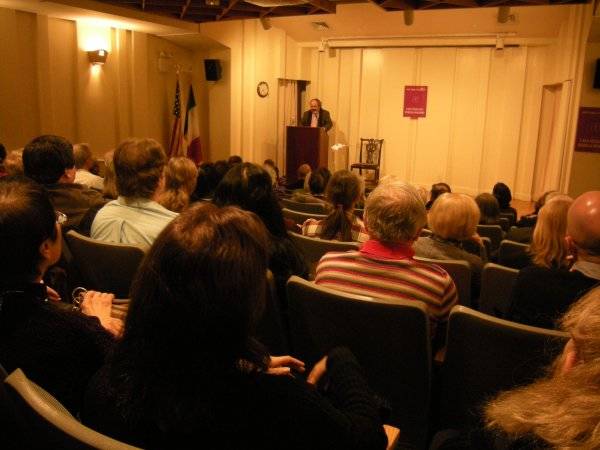The Art of Singing Verdi. A Lecture by Fred Plotkin
On February 22, a large public gathered at Casa Italiana for the popular series Adventures in Italian Opera with Fred Plotkin, which was supposed to feature the soprano Aprile Millo, who was ill and had to cancel. At the last minute, Fred Plotkin came up with a Plan B lecture entitled “Voci Verdiane. The Art of Singing Verdi”.
Plotkin began by telling everyone that he had just returned from Parma – Verdi's home city – and the “Voci Verdiane” festival. Faced with the question “What is a 'voce verdiana'?” he said that there is no single style necessary. Considering that the composer wrote 26 operas over 57 years, it would be impossible for there to be a one way to perform his works. Not only did styles change over Verdi's lifespan, but the nation itself changed many times.
The author of Opera 101: A Complete Guide to Learning and Loving Opera singled out the essential aspects of singing Verdi and accompanied each one with audio selections. He chose Pavarotti's “Sì, lo sento” from I due foscari and Leonie Rysanek's “Nel dì della vittoria” from Macbeth as examples of “Unmistakably Verdian” voices, where the singers understand the music and the words, which led to the aspect of “Language”. The public was offered recordings of Licia Albanese singing “Teneste la promessa” from La Traviata and Alfredo Kraus singing “La donna è mobile” from Rigoletto. The speaker explained the importance of using the breath for acting as well as for support, especially in rendering a character like Violetta – at death's doorstep, at that point of the opera.
Historically, the language in Verdi operas was fundamental for many reasons. Most Italians were illiterate at the time and learned world literature through opera, especially from Verdi's, since he was very close to European literature, and used libretti based on authors such as Shakespeare or Hugo. Also, Verdi wrote two operas on French libretti, Don Carlos and Les Vepres Siciliennes, from which Plotkin selected a recording of Beverly Sills singing “Merci Jeunes Amies”.
Speaking about “Interpretation”, Plotkin explained that singers have to understand the “tinta”, in other words the particular hue, of the opera, since Verdi wrote all kinds of operas with all kinds of different hues. La forza del destino has a rather dark and cold hue, having been written during the composer's stay in Saint Petersburg. The opera expert chose two drastically different interpretations of the “Pace, pace” aria, one very slow and contemplating by Aprile Millo, and one much faster and contained by Eileen Farrell, mainly known as a Wagnerian singer, but perfectly capable of adapting her voice to the needs of Verdi operas.
The final aspect, more complicated to define, was what Plotkin calls the “Imperative”, the ability to convey the specific moods in certain moments of the music, in other words what allows a listener to understand what is happening on stage and what the characters are feeling even without understanding the words. The excerpts chosen were Eileen Farrell singing “Teco io sto” from Un ballo in maschera and Zinka Milanov singing the “Miserere” from Il Trovatore with Jan Peerce.
Finally, the speaker tied all the threads together and played examples of how the different aspects are balanced in a great Verdian voice and a supreme artist. He chose baritone Tito Gobbi performing two completely different late-Verdi roles, Falstaff's “Quand'ero paggio” and Jago's “Credo in un Dio crudel”, from Otello, and Leontyne Price's beautiful “O Patria Mia” from Aida, after which the public dedicated a very long applause to the eloquent speaker, who reminded everyone present that the following Adventure in Italian Opera with Fred Plotkin will take place on March 30 and will feature the great Mezzo-soprano Joyce DiDonato.




































i-Italy
Facebook
Google+
This work may not be reproduced, in whole or in part, without prior written permission.
Questo lavoro non può essere riprodotto, in tutto o in parte, senza permesso scritto.